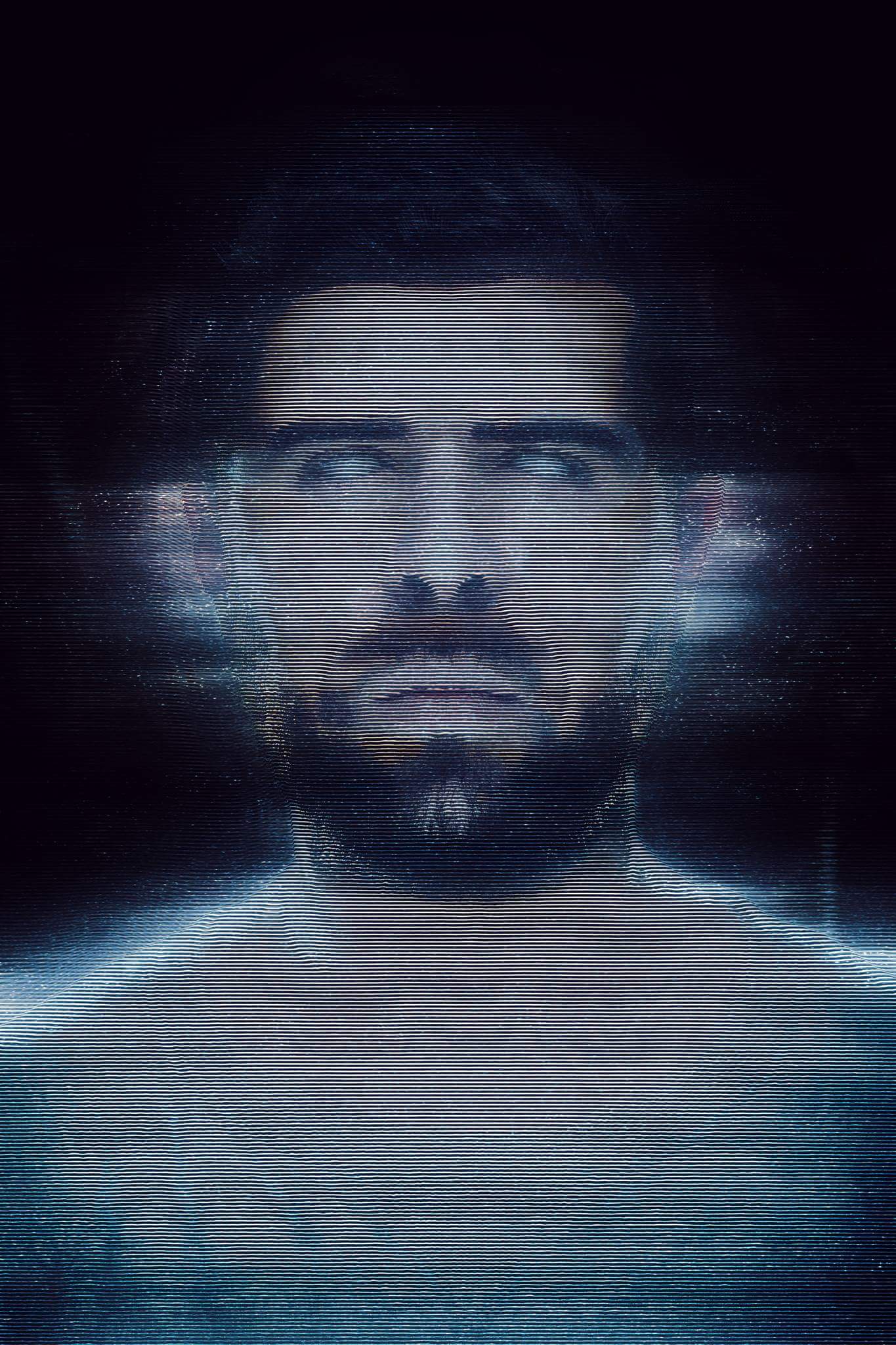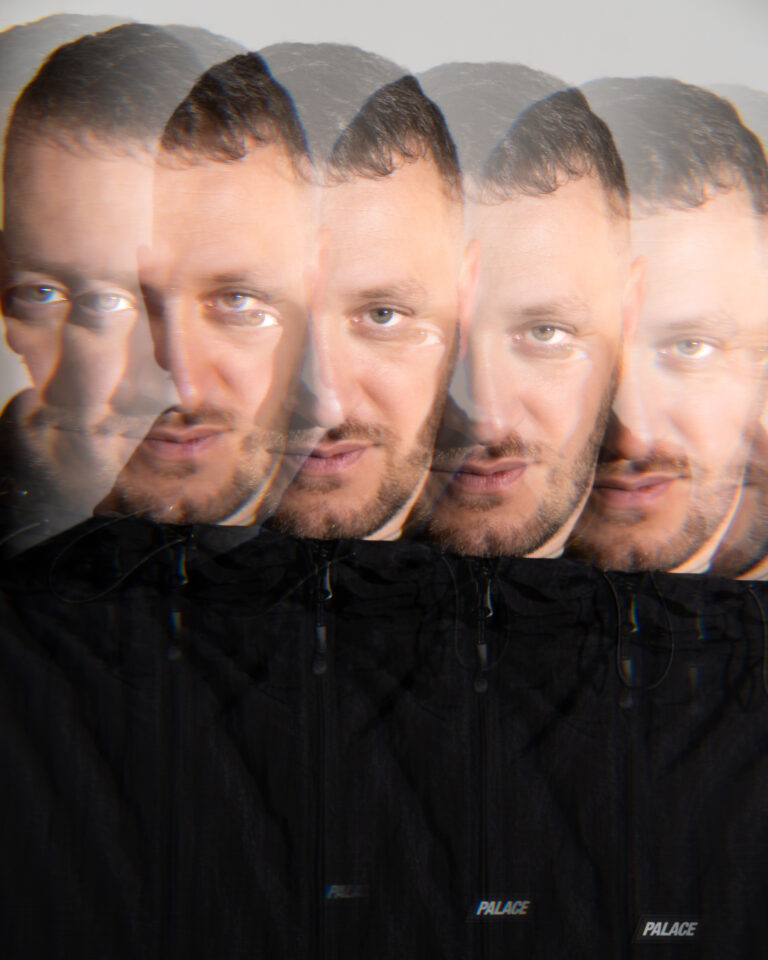Who do you see in the Mirror? Billain invites you to climb inside the next chapter.
A birthday, an album, a myriad of reflections. We’ve followed the story from early release days to the full bloom of a completely new branch of neurofunk; the universe of cyberneuro, cultivated and nurtured by the maestro himself.
Billain’s cyberspace, bass infused odyssey has traced the steps of his characters, throughout their trials and tribulations, perfectly transmuted through his series of albums that act out chapters in their respective collections of tracks – one insane production at a time. Why should the Mirror LP be any different? But it is.
A right turn on the path to the grand destination and gateway to the next iteration of his universe, Mirror pierces the veil, allowing listeners to peer, if not fall head-first, into Billain’s world… which stares right back. Every audible and visual detail invites you to reflect on the message being relayed and how it manifests within your own eyes, as well as setting the stage for real world shifts. Once again, the visionary reimagines the role of drum and bass in multitudes and how we as listeners interact with music. Read on to discover hints of the masterplan, Rorschach reflections and how you are part of this story.
First of all, Happy Birthday! What is one reflection you’ve had on this year?
Every next step is taking me places where I haven’t been before. I really find great enjoyment in learning new things, whether it’s new skills or new paths, especially when they’re intertwined with my creative output. I use every moment of my life as an asset that can express what I do creatively. So what I’m really hoping for, is that it will just continue like this.
The Mirror LP seems to reflect your reflection.
I have a really weird sense of perception of time, because of this I have very little time to enjoy the fruits of my labour. I think it’s a great encouragement for me to be here at LIR and enjoying what’s happening right now with the new stuff. I do have that small buffer of time to think about what comes next. I’m glad I have this moment as it’s rare in my life to have such a thing. It’s a great time to reflect on things in general, in the past or future.
The album feels and sounds like an inner revelation or awakening, some kind of important self reflection is going on. Where are we now in the story?
The art reflects the artist right? I’ve always been forcing people to think about the specifics of the story. With Mirror I considered, what are we facing? What is Broel facing? What is Kira facing in this whole story that I’m creating with the album releases; the cyber neuro narrative of it all. I thought about what we’re facing most of the time in our lives and in my own life, and how listeners perceive the characters themselves. I was always asking, am I projecting myself onto Broel? Am I projecting myself through Kira? And that was a really good question that set me on this path of creating a question mark out of this album; what do we see? I remember personally reflecting on how there are many versions of myself, as many as how many people know you. And everyone perceives you differently. That has to be the same thing with tracks, multiple listeners will have varied perceptions of them, but you never actually use that as a story, as a narrative. I found it extremely interesting to incorporate that, creating tracks and a series of corresponding characters that look like Rorschach texts, that everyone would find their face within.
Does that explain the album artwork?
That explains the album artwork, where we have this actual mirror and the outline of a character or face. And if you take the vinyl artwork, which has a reflective film on it, and hold it up in your hands, the outline will align with your face, creating a whole new character or maybe even transforming you. That was my thought with the artwork, to create a reflective mirror so that you end up in my story. I want that to happen to listeners, I want them to be my story. So that’s one way to break the fourth wall. I love the physicality of it.
That’s a bit mind blowing to say the least! What prompted this decision to break the fourth wall now?
Sometimes you get a theme or sequence of melodies that provoke someone’s personal emotions on a topic, like people singing sad songs where they’re sad about something happening in their life. In a sense, that’s a fourth wall too because they’re connecting this track to something in their private lives that’s happening to them. You hear that mostly in love songs and songs with sequences of lyrics, when you listen to something that touches on the same topic that you’re experiencing. What happens if you do that in drum and bass? What if I put a character in a story, gave them that fourth wall then said, let’s see who the protagonist turns out to be, who’s the antagonist and who are you in general. My whole sequence of albums follows the characters going through their reflections of fights that are happening, have happened or are going to happen. I’m midway there with the sequence of albums. Why not reveal part of a bigger story that I’m also unveiling later on through this fourth wall reflection? All it takes is to include the listener in the actual story and make them part of the whole ride. By now, after so many years, for people who are following my work, for them it’s very personal. So this gives them a deeper level that I want to provide for them.
This goes beyond just connecting with the listener, this invites participation on a whole other level as you say. The supporting details are brilliant, even down to how the tracklist is flipped.
The number of tracks corresponds to the perfect center. There’s a track in the center that’s like a thin surface, represented on the artwork through how the text is the other way around. It’s a suggestion, maybe you’re not the real person. Maybe you’re a person in a reflection. And what is in your reflection? Maybe it’s the truth. We’ve all been there, looking at yourself in the mirror in a personal reassessment of certain situations in life, sitting on a bus going home from the after party, waking up in the morning, looking in the bathroom mirror. But what we see in the mirror is the truth, sometimes a wish, sometimes grief, sometimes regret; something unspoken that we would like to address. That’s why I think that that person in the mirror is braver than me sometimes, that they should be the person on this side, carrying out these feelings in action, instead of me. I flipped the title on the vinyl thinking, maybe that’s the person that we want to be on the right side. What I did with the tracks is a similar thing, the tracklist plays cohesively both backwards and forwards. Very tenety; the outro is the intro. The intro the outro.
That typifies the album lore, but where does ESEF fit into all this? Because it is a RAGER.
Haha, no matter the settings, we have to also reflect the reality outside of the stories. Sometimes we like to reflect the environment where the writer is located and I think also we like to have a little bit of a comic relief like any other film or a book. ESEF was one of those details in the background as a bit of an artist note, saying ‘hey, isn’t that hilarious that we do so much hard work but at the end of the day no one really cares?’. I really hope one day this whole narrative system of storytelling will be enjoyed in its full glory. But at the time being, ESEF. It goes both ways. Life is awesome but we still wish for a better future.
What about Ketchup, though?
That track had a really serious name. But what happened was that I gave myself a bit of freedom of interpretation here. The vocal says some mishmash words that have no meaning, but what we heard when we listened to it was ‘Don’t eat ketchup. Don’t eat ketchup.’ Ketchup compliments the seriousness of one side of the Palindrome, with no super deep explanation to it. If you read the tracks as stories in a book, ketchup would definitely be that header image at the top of the chapter.
It’s definitely the meanest ketchup I’ve ever heard of. Do you actually like it?
Let me reflect on that! …It’s good, depending on the situation. It’s in the middle, it’s between too salty and too sweet!
A classically complex answer from you. Whilst we’re here, what’s your favourite Bosnian food?
Ahhh! Bosnian dumplings – klepe. The closest cousin to it would be gyoza, they go really nicely with cream cheese and paprika, swimming in that as a sauce, served in a clay pot. When producers come to my place, this is what I serve them with chevapi on the side. I’d describe chevapi as meat fingers in a pitta bread with onions. This is the equivalent of UK fish and chips.
Back to inedible things, what’s the objective for the next era of your work? This does feel like a turning point…
It is a turning point. The previous Lands Unbreached album was released alongside the Fugitive film which was a short story explaining one of the characters – Zan’s backstory, in one of his past memories. This was also a human reflection of him, of his robotic self and a question of what it means to have human emotions, memories or memories of emotions. I really like these questions because we are curious beings and we have a tendency to fantasise, wonder and romanticise about these things. I really wanted to extend beyond the short film with the whole thing. So we did this scary scene from the film’s universe, with this one short in a found footage style. I released it unexplained on my YouTube channel as a sort of puzzle piece that was also a part of the story but people didn’t realise it. That is really my ultimate goal; that people forty years from now, hunt for these puzzle pieces and put them together to see the full picture. It’s complicated to bring this to life, because you have to hold on to many beautiful things you can’t reveal yet. You have to plan. Carefully. You have to do more work beyond just releasing the tracks. I’ve always wanted more than that and I’ve found a way to fit in without demanding too much from today’s standards, in the form of films combined with music, in the domain of what we call now a cyberneuro movement. It’s a big community now of people who love the narrative with the music, launched with Nomads Revenge. It’s a simple sci-fi story that now evolves, from this point onwards.
The plot thickens. The community is advancing out of the digital world, into the physical…
I did promise the people a sequence of albums, Mirror is the midway turning point of the series of albums. It’s intertwined perfectly with movements in the wider cyberneuro genre and the Discord server I’ve built for the cyberneuro community. It’s grown so much, with the genre evolving into multiple BPMs but with the same type of narratives. It’s such a cinematically oriented music genre anyhow. All I can say now is that we’ve started a secret project. We can only call it Cybe, it’s a part of an intricate, years in the making, plan for the cyberneuro movement that we hope to launch later this year. Fugitive picked up over thirty awards, even the upper echelons of gaming and film are interested in our works now. I want to engage and even hopefully employ people from the cyberneuro community to expand on this, as a part of the team. It’s a very complicated task but because of that unique underground position we’re in, we’re using that community power to be able to create some feature films in the coming years, and we’ll see that as a part of the whole narrative. It is going to expand in an interesting way and I’m really happy that these people are paying attention to drum and bass in this way.
I know your universe and planning transcend time and space, but was there a singular external life event that prompted this self-reflective piece of the puzzle in the first place?
It’s a series of events that moulds a personality right? For me it was these really weird circumstances of being in a war zone but also realising the importance of life or the passage of it. Knowing that, brings you closer to being more serious about everything you do in life. As a kid I drew eyes quite a lot, I was fascinated by human gaze interactions.
The eyes are the windows to the soul.
Pretty much, that’s one of many interpretations that we never actually find answers to. We always find words that even themselves cannot manifest through other people. You see many things in the eyes and I found that extremely beautiful. The eyes mirror how people perceive you and you can sometimes see what someone thinks of you by the way they are looking at you, which is fascinating. So yeah it was a series of events in a specific timeline that made me think and create questions for myself; how do I interpret these events in my life? Or how do I value them? It’s not a coherent series of events, but to me they are. They make sense together in the end. If you can explain them that way, I think life gets a little bit simpler in the way of writing your own story. Maybe this series of albums are the autobiography and the biography, or maybe a biography and everyone’s reflection, which I really hope for it to be. But if you can interpret it in multiple ways, then my work is definitely done.
It sounds like you’ve been meditating more on what legacy you want to leave behind.
Well whether its their books, art or whatever, ideally every artist wants to have a series of works that connects the context of their life work in some way. I can’t speak for every single artist out there and how they see the world. But what you really want to do, if you’re a human being aware of other human beings on this planet, is you want to contribute in some way, whether it’s through creative work or just helping other people. If I can, I would like to share a very special story and I would like that to be… well I don’t believe in self help books but I do believe in a ‘help’ book. There’s a great author whose books encourage reflection through metaphorical writing. I thought, why can’t I do the same thing with music? You can have multiple dimensions in music and have no problem instead of being one dimensional.
It’s a question of collective responsibility; once you reach a certain stage, it’s good to consider how you can give back to the community around you that supported you in that journey.
That’s the thing Johnny Cash and Trent Reznor were singing about right? At the end of the day, you can have it all; your ‘empire of dirt’, but you’re not going to take any of that stuff to the grave, so you might as well be a nice person from the start of your life and do something for your community. We can see the world going through this deep and dark depression and we can actually change it. We can change it, we could be better than we ever were, it just takes more people who are willing to share with and think of others.


